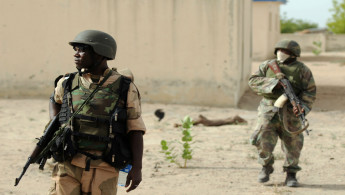Nigerian official says new leader of IS-linked group killed
Nigerian security forces have killed the new leader of an Islamic State-linked extremist group blamed for killing hundreds in Nigeria and neighboring West African countries, a senior security official said on Friday.
Nigeria’s national security adviser Babagana Monguno said that Malam Bako, who recently succeeded Abu Musab al-Barnawi as leader of the Islamic State in West Africa Province (ISWAP), was "taken out" by troops earlier this week.
Bako's death could not be independently verified and there was no immediate confirmation from ISWAP. The development would be another heavy blow on ISWAP following last week's announcement by the Nigerian military that al-Barnawi was killed.
Bako was in August appointed a member of the Shura Council, ISWAP’s consultative assembly, as the militants consolidated their position in the Lake Chad basin following the death of rival leader Abubakar Shekau of the Boko Haram extremist group.
Monguno praised Nigerian security forces fighting the extremist rebels in the northeast and the Lake Chad basin for doing "an excellent job" after eliminating ISWAP's leader and his successor within a span of a month.
He said the IS-linked group is facing a leadership crisis and that Nigerian military operations have put "a lot of pressure" on ISWAP and its rival Boko Haram.
The reported killing of al-Barnawi and Bako have refocused attention to the conflict in Nigeria’s northeast, that began 12 years ago with an insurgency launched by the Boko Haram.
The Nigerian military recently announced that about 6,000 militants have so far surrendered following Shekau’s death in June this year. Security experts told the AP that most of those surrendering were forced to join Boko Haram under Shekau or didn't want to associate with ISWAP, which has been Boko Haram’s rival since the groups' 2016 split.
Unlike Boko Haram which often violently targets civilian populations, ISWAP targets the Nigerian military and those who aid soldiers.
IS has also tried to capitalize on Shekau's death by launching a massive recruitment drive and gaining more Boko Haram-held territories especially within the Sambisa forest.
The United Nations Development Program estimates that the conflict has resulted in 350,000 deaths, with 314,000 of those from indirect causes.





 Follow the Middle East's top stories in English at The New Arab on Google News
Follow the Middle East's top stories in English at The New Arab on Google News
![The UAE is widely suspected of arming the RSF militia [Getty]](/sites/default/files/styles/image_330x185/public/2024-11/GettyImages-472529908.jpg?h=69f2b9d0&itok=Yauw3YTG)
![Netanyahu furiously denounced the ICC [Getty]](/sites/default/files/styles/image_330x185/public/2024-11/GettyImages-2169352575.jpg?h=199d8c1f&itok=-vRiruf5)
![Both Hamas and the Palestinian Authority welcomed the ICC arrest warrants [Getty]](/sites/default/files/styles/image_330x185/public/2024-11/GettyImages-2178351173.jpg?h=199d8c1f&itok=TV858iVg)